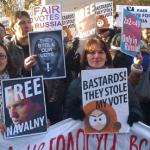Russia Without Putin by Tony Wood Review – Myths of the New Cold War

The title of this excellent book is a bit of a come-on. It seems to echo the slogan that was chanted in Moscow in 2012 by crowds calling for regime change. In reality, it is a challenge to them and their western supporters for being so fixated on Putin and his personality that they fail to understand that he bestrides a system that is deeply entrenched and will easily survive him.
In the first piece of myth-debunking promised in his subtitle Tony Wood argues that Putin’s system is not a deviation from the Yeltsin years when the Russian elite enthusiastically embraced capitalism; it is a direct continuation of it. There may have been a minor shift under Putin towards the restoration of partial or full control by the state over some of the big resource-extracting companies in the raw material sector. But the intertwining of government and big business, the creation of an oligarchy and a huge widening of income differentials in favour of the rich were initiated under Yeltsin. To call Putin’s Russia a mafia state is therefore a mystification, since its elements – the hollowing out of elections so as to remove genuine democratic content, the promotion of former security agents to top jobs in the state apparatus and the entanglement of officialdom with organised crime – were all there under Yeltsin, too. Western governments and the advisers they dispatched to aid the Kremlin’s economic ministries at best turned a blind eye; more often they connived at it.
The second myth is that where there were negative distortions in Russia’s transition to capitalism it was because of the legacy of the Soviet past with an authoritarian ruling class and a population made passive by decades of submission to power. Here Wood is bold enough to confront the prevailing narrative of several prominent Russian writers and sociologists, as well as western observers, who adopt a kind of social Darwinism in arguing that it will take another generation for Homo Sovieticus to die out. Wood turns the argument on its head: “Rather than being a hindrance, the remnants of the Soviet past have been a massive boon for post-Soviet Russia,” he writes. Russians were willing to put up with devastating inflation, the destruction of their savings, the loss of jobs and the closure of much of industry because these hardships were softened by the survival, at least until recently, of low rents, free medicine, the pension system and other aspects of the welfare state. This parallelism of old and new structures smoothed the path of capitalist transition and forestalled massive rebellion.
The third myth that Wood demolishes involves Russian foreign policy. As western relations with Russia spiral downwards, his arguments deserve the widest possible audience if we are not to waste more and more resources on an unnecessary confrontation with the Kremlin or, worse still, risk armed clashes.
The fundamental fact, as Wood sees it, is the huge imbalance of power and resources between the west and post-Soviet Russia since the end of the cold war. In the 1990s the west wanted to drive home its advantage, hence the expansion of Nato that Russians, elite as well as people, came to resent. Not initially, though. Under Yeltsin and in Putin’s first few years as president, Russians wanted to be part of the liberal internationalist US-led bloc of developed states. The downfall of that idea was caused by the west’s rejection of Russia’s repeated proposals to join Nato, followed by Washington’s promotion of “colour revolutions” in Georgia and Ukraine in 2003 and 2004. Even as recently as 2011 when Dmitry Medvedev was president, Russia went along with the west on a major foreign policy issue by declining to use its UN security council veto to block the west’s intervention in Libya.
It was the second Ukrainian crisis of 2014 that sealed the divorce, though Wood believes Putin’s hostile reactions smacked of tactical improvisation rather than a carefully planned anti-western strategy. Interference in western elections is the Russian answer to the earlier and still continuing efforts by the US and EU to help civil society groups and local media to campaign for anti-Kremlin changes within what used to be the Soviet camp. Perversely, each sides’ activities help the other. Western sanctions make it easier for Putin to rally support from his electorate, while his annexation of Crimea and his use of force in eastern Ukraine benefitted the western establishment. The Kremlin’s actions let the west revert to comfortable old cold war stereotypes of Russia, increased Ukrainian public support for Nato membership, which used to be lukewarm, and strengthened military ties between Nato and Ukraine’s armed forces, bringing Nato closer to the Russian heartland.
So Russia is in a kind of limbo and will remain so for some time, both in foreign policy and domestically. The gradual decline of Pax Americana and the rise of China will open new options, positive and negative. Patriotic mobilisation by Putin or his successors will not be enough to paper over increasing social and economic unrest if energy prices go into long-term slump. For the moment, as long as the west maintains its hostile anti-Russian stance, the Yeltsin/Putin system is relatively secure.
• Russia without Putin: Power, Politics and the Making of Post-Soviet Society by Tony Wood (Verso, £16.99). To order a copy for £14.95, go to guardianbookshop.com or call 0330 333 6846. Free UK p&p over £15, online orders only. Phone orders min. p&p of £1.99.
To order a copy from Verso go to: https://www.versobooks.com/books/2839-russia-without-putin
